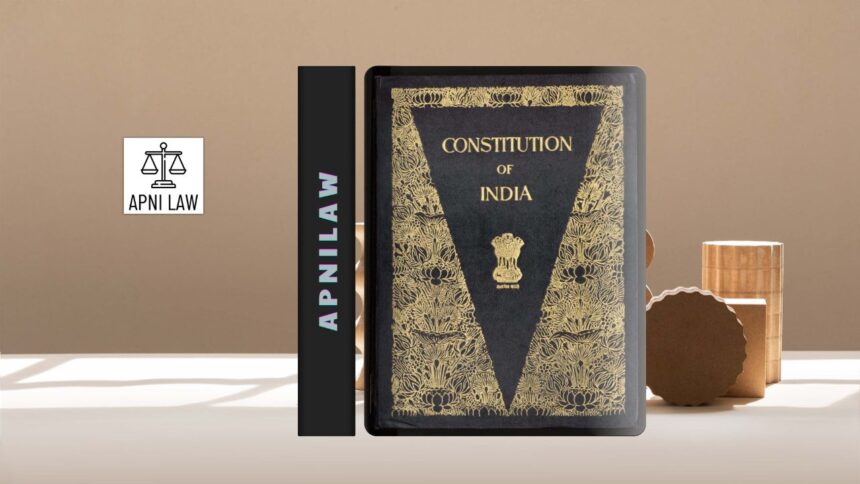Introduction
The Preamble of the Indian Constitution is not just a formal statement, it expresses the core values of the nation. It serves as the guiding philosophy for governance and reflects the goals of the framers. Among its most powerful terms are Sovereign, Socialist, Secular, Democratic, and Republic. These keywords define India’s identity and its system of government. Understanding these words is essential for every citizen. They explain how the State functions, protect individual freedom, and guide the working of democracy in India.
When the Constitution came into force in 1950, the Preamble included some of these words, while others were added later. The 42nd Amendment in 1976 introduced Socialist and Secular to strengthen social and secular principles. Each of these words has a deep meaning, a historical background, and practical implications in modern governance.
Sovereign: Complete Independence
Sovereign means that India is an independent nation with full authority over its internal and external matters. No foreign power can control India’s decisions. This independence allows the country to make its own laws, control its economy, and form foreign policies. The concept of sovereignty reflects the idea that ultimate power rests with the people. India can sign treaties, manage defense policies, and act freely in international relations. After colonial rule, this independence gave India the strength to shape its future without external interference.
Socialist: Promoting Equality
The term Socialist was added through the 42nd Amendment in 1976. It shows the commitment to social and economic justice. Indian socialism is democratic, not rigid like communism. It does not abolish private property but aims to reduce inequality in wealth and opportunity. Policies such as land reforms, labor rights, and welfare schemes reflect socialist ideals. The Directive Principles of State Policy also promote equal distribution of resources. This approach ensures that the benefits of growth reach everyone, not just the privileged few.
Secular: Respect for All Religions
Secularism is a key principle of the Indian Constitution. It means that the State does not favor any religion and treats all religions equally. In India, secularism is based on positive neutrality. The State allows freedom of religion but does not interfere unless public order or unity is at risk. In a country with multiple faiths, this principle maintains harmony. It ensures that no citizen faces discrimination because of their beliefs. Secularism continues to be a strong pillar of India’s unity in diversity.
Democratic: Power in the Hands of the People
Democracy ensures that power belongs to the people. Citizens elect their representatives through free and fair elections. This principle guarantees equality in political participation. Every adult has the right to vote, regardless of caste, religion, or gender. Democracy gives citizens a voice in governance and makes the government accountable. Fundamental rights such as freedom of speech, equality, and the right to constitutional remedies protect democratic values. Regular elections and independent institutions keep the system transparent and responsible.
Republic: Elected Head of the State
The word Republic means that the head of the State is elected and not hereditary. In India, the President is elected by an electoral college. This ensures that the highest position in the country is not based on birth but on merit. It reflects equality and fairness in governance. The Republic nature of India reinforces the idea that no royal family or elite group can hold power permanently. Every citizen has the right to aspire to the top constitutional post.
Background and Landmark Judgments
The idea of sovereignty came from the desire for complete independence after British rule. Socialist and Secular were included during the 42nd Amendment in 1976 to highlight social and secular ideals during a time of political change. The term Democratic was inspired by global democratic principles, while Republic was adopted to remove any hereditary privilege.
Several Supreme Court cases have reinforced these principles. In Kesavananda Bharati v. State of Kerala (1973), the Court held that the basic structure of the Constitution, which includes democracy and secularism, cannot be altered. In S.R. Bommai v. Union of India (1994), the Court declared secularism as a fundamental feature of the Constitution. These cases highlight the legal protection of these values.
Impact on Governance
These keywords shape policies even today. Sovereignty guides India’s foreign relations and defense policies. Socialism influences welfare schemes such as free education, health programs, and poverty reduction. Secularism maintains harmony by ensuring equal treatment for all religions. Democracy ensures accountability through elections and public participation. Republic guarantees equality by removing hereditary rule and ensuring that leadership is based on democratic choice.
FAQ
What does Sovereign mean in the Preamble?
It means India is completely independent and makes its own decisions without external control.
Why were Socialist and Secular added later?
They were included in 1976 by the 42nd Amendment to strengthen social and secular values.
How is India both Democratic and Republic?
Democracy means government by the people, while Republic means the head of the State is elected and not hereditary.
Conclusion
The keywords Sovereign, Socialist, Secular, Democratic, and Republic are the backbone of the Indian Constitution. They define the political structure, ensure social justice, and protect equality. These words continue to guide governance and safeguard the rights of every citizen. Understanding them helps us appreciate the values that keep India united, inclusive, and strong as the world’s largest democracy.
For any specific query call at +91 – 8569843472








